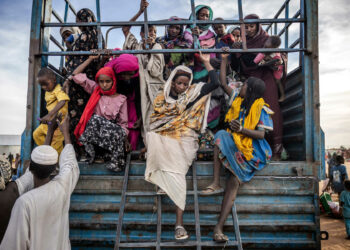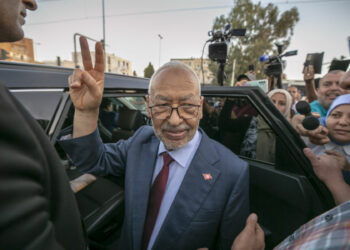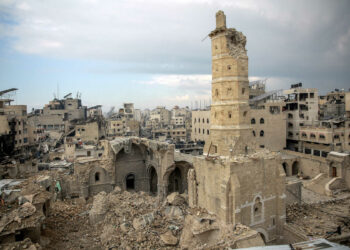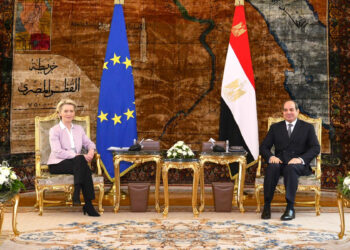Emad Shahin is the Dean of the College of Islamic Studies (CIS), Hamad bin Khalifa University, Qatar Foundation and a Senior Fellow at the Alwaleed Bin Talal Center for Muslim-Christian Understanding at the Edmund A. Walsh School of Foreign Service at Georgetown University.
Click here to learn more about Emad.
Egyptian academic
Speaking about democracy in the Middle East and North Africa region these days may be viewed as a luxury – completely out of touch with grim realities. What can democracy offer to a region ravaged by civil wars, societal breakdowns, factionalism and sectarianism, and failing autocratic states that routinely violate basic rights and fundamental freedoms to maintain their grip on power?
And yet, it is precisely the need to confront and resolve these grim challenges that makes the question of democracy in the Arab world more urgent now than ever. The region is undergoing a painful but long overdue transformation away from an old order that has failed to respect and uplift its own people to a new one that enfranchises all its diverse citizens and communities. It needs a working formula and an effective agency to bring about this transformation to democratic systems of government and to rebuild national integration.
Lessons of History
The current situation in the MENA region bears similarities to the pre-World War I period that witnessed the collapse of an old order and the birth of a new one: popular uprisings and mass protests; reassertions of repressed identities; calls for democratic governance with basic political/constitutional rights (Iran 1905, the Arab Revolt 1916, the Egyptian Revolution 1919, the Great Syrian Revolution 1925, the Buraq Uprising 1929, the 1934 uprisings in Morocco and Tunisia, etc.); outbursts of sectarian and ethnic conflict; imperial interventions to carve up the remains of the Ottoman empire; economic capitulation to foreign powers marked by rapid extraction of the region's natural and human resources; and violent repression of local movements for independence and self-determination.
At the same time, two remarkable differences stand out between these pivotal moments in history: the formula and the agency. In the period before WWI, the secular "nation-state" was the formula used to replace the atrophying Ottoman caliphate and reshape the entire region. Most nationalist movements struggling for independence operated under this framework. The second difference is the "mandate system," which was superimposed by the British and French colonizers and their local interlocuters, and which never contained the transnational affiliations of the peoples.
Viewed decades later from today's perspective, the Arab model of nation-states has clearly run its course. It is exhibiting all the typical signs of a collapsing system: autocratic repressive regimes, simmering popular discontent and periodic mass uprisings, gross violations of human rights, failing states, ethnic conflicts, civil wars, and foreign interventions.
The Arab Spring highlighted the need for a new transformation of the Arab order—a new political framework based on dignity, democracy, and social justice.
The message that "people want to change the system" was a clear and unmistakable demand for a new order. The counter-revolutionary and anti-democratic actors—primarily the governments of Saudi Arabia, Egypt, and the United Arab Emirates, and their Western backers—sought to pre-empt the danger of emerging democratic systems exhibiting popular sovereignty and free will. The ongoing civil wars, deliberate destabilization, fomented ethnic and factional conflicts, and the state of incapacity that the region has been experiencing since 2011 cannot be disconnected from the designs of some regional and international actors to engulf the Arab region in chaos, violence, and submission.
The Way Forward
The MENA region can forge one of two trajectories: the first is to continue to play into the hands of the anti-democratic regional and Western actors; this will perpetuate the current state of fragmentation, civil wars, and the depletion of human and natural resources. The second is for free and liberal actors from different ideological and political backgrounds to take full ownership of the design and birth of a new Arab order. Stakeholders with genuine interest in democracy, basic human rights, and the rule of law must bear the responsibility of conceiving the shape, common values, and mechanisms to build a new order.
The region's history provides inspiring examples. In 1913, Arab intellectuals, politicians, and notables faced similar challenges. They responded by convening the Arab Congress in Paris with representatives from across the Arab world. They discussed the basis of a new order under three main principles: resistance to foreign occupation, securing the fundamental rights of the Arabs, and initiating reforms. Following the conference, reform-minded groups and committees sprung up in various Arab provinces and a conscious decision was made to support and advance only those politicians who believed and upheld these principles.
The region is in need for a similar conference once again. It will not be the magic wand that solves all problems, but it will set the priorities for change and the ways to address the challenges of national integration, state-building, governance, and true independence. Like their forerunners, the pro-change elites need to rise above their parochial differences and build a common ground that upholds democracy, social justice, and self-determination as shared objectives and the pillars of a new DAWN.
We need to look for a formula that delivers peaceful resolution to conflicts, inclusion and participation of all segments of society, respect for pluralism and diversity, rule of law, governance, participation, and peaceful transfer of power. The system of government that can provide these elements is democracy. Putting ideological prejudices aside, a democratic system reflects agreed-upon values and practices that can ensure peaceful coexistence, national integration, protection of rights, and proper checks and balances.
The other requisite is an effective agency to achieve a democratic transformation. One of the bitter lessons learned from the Arab Spring was the lack of vision, weakness, and fragmentation of the political actors meant to lead the movement for change. Democratic transition is a long process with multiple phases. It cannot succeed without effective agents. For the first phase of the struggle against dictators and autocrats to succeed, determined political agents have to put aside their ideological differences and personal egos to build broad coalitions, rally around shared and unifying values and clear demands, and eventually develop a vision and program to guide the future of their respective societies after the collapse of the authoritarian regimes. Short of these elements, a new order will arise, not as a new dawn, but as more of the same.







